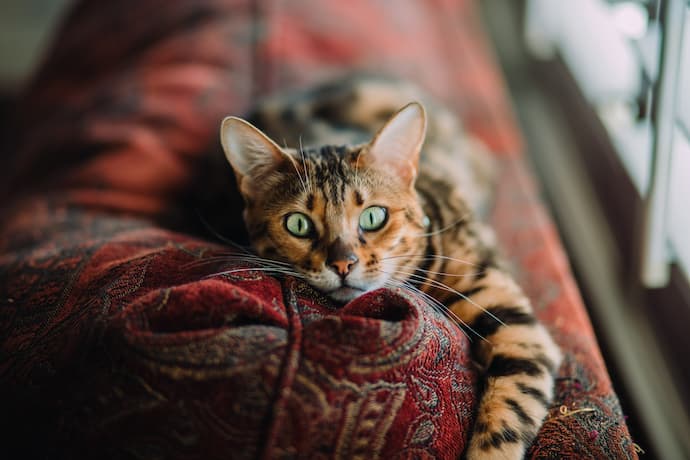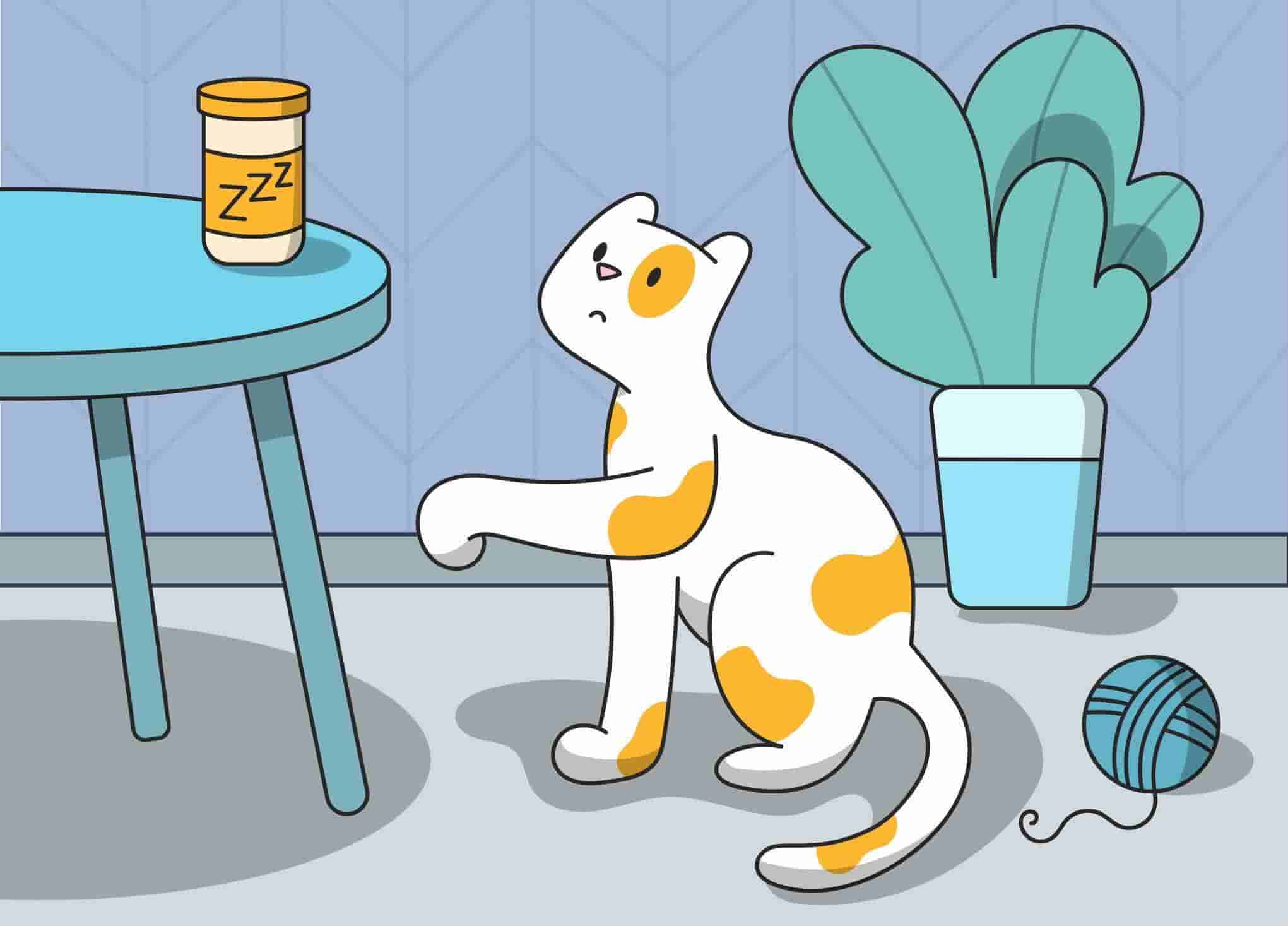Melatonin is a popular supplement commonly used in humans to treat sleep problems like insomnia and jet lag. Its calming effects make it a useful supplement in treating anxiety too, and it's readily available over the counter at most pharmacies.
Recently, various anecdotal accounts have indicated that melatonin can be used with success in cats and dogs as well.
Stop Googling - Ask a Real Vet
What is melatonin?
Melatonin is a hormone that is naturally produced inside the body, making it a far more popular choice to treat sleep problems than more chemical interventions. This hormone is usually released inside the body in response to darkness and plays a vital role in regulating the sleep-wake cycle.
In addition to regulating sleep, melatonin has a relaxing, sedative-like effect and can assist in calming the processes of the body.
Can cats have melatonin?
"Can I give my cat melatonin?"
In general, melatonin is produced naturally in the body of both humans and cats. Therefore, its consumption is likely to be safe for your pet. Nevertheless, the consumption of this supplement should be in the right dosage and under the right circumstances.
The best solution is to consult your veterinarian and not to self-medicate. Because, for example, human supplements are not always safe for cats. Also, supplement brands formulated for humans can contain ingredients and dosages that are not safe for your cat, so try to stick to brands specially formulated for pets. Always think of your pet's safety first.
Melatonin for cats: Uses
"What does cat melatonin treat?"
While melatonin as a supplement for cats seems useful, there's not enough scientific data as melatonin use in cats has not been thoroughly studied. Most of the positive evidence associate with melatonin use in cats is anecdotal.
It seems that melatonin for cats has shown improvement for health and behavioral issues. Overall, the action of melatonin in cats is a sedative one, helping felines with anxiety and sleep problems.
Sleep problems
Most cat owners will tell you that the only problem their cat suffers from is sleeping too much. While it's true that cats spend approximately two-thirds of their lifetime asleep, some older cats may develop problems with a regular sleep-wake cycle, commonly seen in those cats with cognitive disorders similar to Alzheimer's.
Anxiety
Melatonin can be a handy tool to use whenever you need to keep your cat calm. For example, in those situations where you know your cat is likely to suffer from anxiety – a trip to a vet, thunderstorms, or moving house.
Those cats who suffer from separation anxiety will undoubtedly benefit from the calming properties of melatonin.
Other
Melatonin for cats can also help treat epilepsy, hyperactivity, hair loss, and digestive issues.
Melatonin might work in treating various ailments, but it isn't without its risks. It's critical to work closely with a vet when choosing to supplement your cat's diet or make significant changes to your cat's lifestyle. You can contact an online veterinarian service to consult what melatonin brand can be useful for your cat.
In some cases, cat breeders might also use melatonin to suppress the cat's sexual cycle for a short but defined period. While the research points out that you can give cats melatonin, its duration and effects in suppressing the sexual activity are not guaranteed. The link between a sexual activity and the melatonin intake in cats certainly deserves more research. Yet, the existing studies assume that a moderate melatonin dose for cats can suppress sexual activity in cats.
If your cat has any existing conditions or is currently on medication, abstain from giving any supplements, including melatonin. As it always works with supplements and medicine, consulting a vet first is a must, and you have two options here: visit the vet clinic or get your question answered in a minute with a Petcube Online Vet.
Potential side-effects of melatonin for cats

"Is melatonin safe for cats?"
At the correct dose and under the right conditions, melatonin is generally safe for cats but should always be used under supervision. Because it's a hormone, there's a chance that melatonin can interact with other bodily processes or have little effect.
Some of the melatonin side effects in cats are:
- Drowsiness
- Weight loss or weight gain
- Itching
- Stomach upset
- Confusion
- Fertility changes
Melatonin in cats should be discontinued at the sign of any side effects or allergies.
Because melatonin is a hormone, its likely to impact other hormones in the body. Therefore, it should never be given to pregnant or sexually immature cats. Cats with liver, kidney, or heart conditions are at an increased risk for adverse reactions and should be supplemented cautiously.
Melatonin dosage for cats
"How much melatonin can I give my cat?"
Melatonin is usually given orally in the form of a capsule, tablet, or liquid. It can be given with or without food up to three times a day. The effects are usually fast-acting, and you should see an improvement in symptoms within an hour or two.
As a rough estimate, an adult cat of average size could probably start off with a dose of 0.75mg of melatonin, repeated up to three times a day, but this is a very rough starting point.
The dose will vary depending on several factors, including your cat's age and size as well as the condition you're wanting to treat. A veterinarian will be able to give you all the advice you need about the correct dosage.
If you're opting for a brand formulated for human consumption, make sure to check the ingredients to make sure that the supplement doesn't contain additional ingredients that may be harmful to your cat. Better still, choose a brand that is specially formulated for cats.
How The Emergency Fund Can Help During Unexpected Situations
Ingesting ingredients that aren’t safe for cats may lead to toxicity, which is a pet emergency. In such unexpected situations, having the assurance that your cat is given the proper care and treatment that they need should be a priority. Pet Emergency Fund offers a good investment for you and your furry pals.
A Pet Emergency Fund subscription has a coverage of $3000 per year for pet emergencies of up to 6 pets. Bill payments are done right after treatment as well. With a Pet Emergency Fund, you won’t have to worry about whether you can afford treatment to save your pet. They care for you and your pets, and they want to be there for you, especially during challenging times.
Fortunately, as one of our blog readers, you can get 27% off on subscriptions if you follow this link. This promotion is exclusive for our blog readers only.
Final thoughts
If your cat shows symptoms that you assume may benefit from a melatonin supplement, your first port of call should always be a competent veterinarian. Avoid self-diagnosing problems and self-treating, even though melatonin is a naturally occurring hormone in a cat's body.
There are risks associated with supplementation, especially in pregnant or sexually immature cats and those undergoing treatment for other conditions. Melatonin is also not a miracle cure. Its effectiveness has not been adequately studied and so should always be used with caution.
Human medications and supplements are generally not appropriate for animal use and should never be used without the guidance of a trained professional.
Was this article helpful?
Help us make our articles even better









